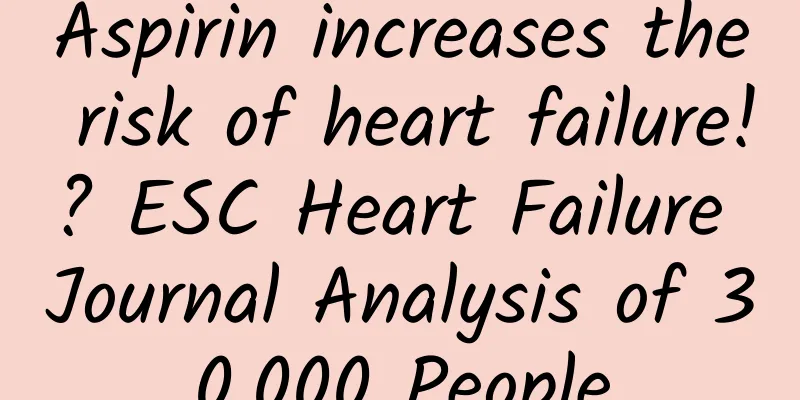Aspirin increases the risk of heart failure!? ESC Heart Failure Journal Analysis of 30,000 People

|
In recent years, the use of aspirin for primary prevention of cardiovascular disease remains controversial. On November 22, a study published in the European Society of Cardiology (ESC) Heart Failure Journal found that in patients with at least one risk factor for heart failure (including smoking, obesity, hypertension, hypercholesterolemia, diabetes, and cardiovascular disease), the use of aspirin actually increased the risk of heart failure. The authors pointed out that the results of this study need to be further verified, but suggest that aspirin and heart failure have a potential association. Once the results of this study are confirmed, people with risk factors for heart failure or those who already have heart failure should use aspirin with caution. The study involved 6 European and American observational studies, involving a total of 30,827 patients aged ≥40 years who were at risk of heart failure but had no heart failure at baseline. Of these patients, 33.9% were women, with an average age of 66.8 years, and 25% were taking aspirin. During a median follow-up of 5.3 years, 1,330 people developed heart failure. After adjusting for factors such as age, sex, body mass index, smoking, drinking, blood pressure, heart rate, cholesterol, creatinine, hypertension, diabetes, cardiovascular disease, renin angiotensin aldosterone system inhibitors, calcium channel blockers, diuretics, beta-blockers, and lipid-lowering drugs, the analysis showed that patients using aspirin had a 26% increased risk of heart failure compared with those not using aspirin. Further propensity score matching analysis also obtained the same results. Among 22,690 patients (73.6%) without cardiovascular disease, those who used aspirin had a 27% increased risk of heart failure. Aspirin use was consistently associated with HF risk across all baseline systolic and diastolic blood pressure levels. The researchers further found that among non-diuretic users, aspirin users had a slightly increased risk of heart failure compared with diuretic users (HR, 1.14 and 1.38, respectively). Similarly, among those not using statins, those who used aspirin had a higher risk of heart failure (vs those who used statins at baseline, HR=1.5 vs 1.19). The researchers pointed out that hypertension is one of the main risk factors for heart failure. People who take diuretics may benefit from the good control of blood pressure by diuretics, while people who do not use diuretics may suffer from renal damage due to aspirin and increase the risk of heart failure. Aspirin interacts with statins and may increase the platelet response to aspirin, thereby further reducing platelet aggregation. Source: China Circulation Magazine |
>>: Special Topic: Obesity - the root of all diseases (4)
Recommend
My period is like blood and the color is very light, what's going on?
If women do not maintain good living habits in th...
Does ovarian cyst removal affect fertility?
Does ovarian cyst surgery affect pregnancy? If th...
What kind of tea set is better for Pu'er tea? Is Pu'er tea hot or cold?
Pu'er tea has the benefits of lowering blood ...
One month pregnant belly bulge
Generally, a woman's belly will not become no...
CNNIC: The 45th Statistical Report on the Development of China's Internet in 2020 - Online Payment
Add 199IT official WeChat account [i199it] and re...
How to treat acne on the forehead? These methods can remove acne
Acne is probably the natural enemy of all women. ...
High ALT in mid-pregnancy
Women must take good care of their bodies during ...
Will I still get acne on my face after pregnancy?
Pregnant women may also develop acne on their fac...
In what situations or scenarios can you not wear a mask? One picture to understand!
Recently, the State Council Joint Prevention and ...
How long does it take to do a NT test?
For pregnant women, whether the growth and develo...
Counterpoint: Samsung's global foldable screen shipments plummeted 42% year-on-year in Q1 2024
Samsung, which once had an absolute advantage in ...
Numbness in female right hand
Numbness in a woman's right hand may be cause...
Why don't these women wear underwear?
Many people wonder how men and women in ancient t...









